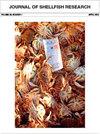Comparing Habitat Suitability Forecasts for the Gulf of Maine and Southern New England American Lobster Stocks
IF 1
4区 农林科学
Q3 FISHERIES
引用次数: 0
Abstract
ABSTRACT The future of American lobster (Homarus americanus; H. Milne Edwards, 1837) habitat has been extensively studied in the Gulf of Maine and Georges Bank regions, but studies quantifying spatiotemporal changes to suitable habitat in Southern New England (SNE) regions remain sparse. The American lobster stock assessment for SNE is conducted separately from the northern stock because of negligible migration and recruitment sharing between them. This fact, coupled with the assumption of spatial nonstationarity between the two stocks when it comes to environmental preferences, suggests that analyses of suitable habitat must be conducted for each stock region independently. This study employs the use of a previously developed habitat suitability index model for American lobster to map historical and forecasted habitat in both the Gulf of Maine and SNE stock regions so that comparisons between long-term forecasts can be accurately made. The suitability indices generated in this study support the hypothesis of environmental nonstationarity between the stocks, with lobster in SNE preferring significantly different environments than their northern counterparts. In the coming decades, the Gulf of Maine lobster fishery may see changes in lobster migration timing as spring suitability decreases and fall suitability rises, whereas the SNE fishery will most likely see the continued use of northern waters by lobsters as more southern waters become less suitable. The rate of change in SNE remains smaller than in the Gulf of Maine owing to the lesser rate of warming observed.缅因湾和新英格兰南部美国龙虾种群栖息地适宜性预测的比较
摘要美国龙虾(Homarus americanus;H.Milne Edwards,1837)栖息地的未来在缅因湾和乔治银行地区进行了广泛的研究,但对新英格兰南部(SNE)地区合适栖息地的时空变化进行量化的研究仍然很少。SNE的美国龙虾种群评估与北方龙虾种群分开进行,因为它们之间的迁徙和招募共享可以忽略不计。这一事实,再加上在环境偏好方面两种种群之间存在空间非平稳性的假设,表明必须对每个种群区域独立进行合适栖息地的分析。这项研究使用了之前开发的美国龙虾栖息地适宜性指数模型,绘制了缅因湾和SNE种群区域的历史和预测栖息地地图,以便能够准确地进行长期预测之间的比较。本研究中产生的适宜性指数支持种群之间环境非平稳性的假设,SNE中的龙虾比北方龙虾更喜欢明显不同的环境。在未来几十年里,随着春季适宜性的降低和秋季适宜性的提高,缅因湾龙虾渔业可能会出现龙虾迁徙时间的变化,而随着更多的南部水域变得不太适宜,南部沿海渔业很可能会看到龙虾继续使用北部水域。由于观测到的变暖速度较小,SNE的变化速度仍然小于缅因湾。
本文章由计算机程序翻译,如有差异,请以英文原文为准。
求助全文
约1分钟内获得全文
求助全文
来源期刊

Journal of Shellfish Research
生物-海洋与淡水生物学
CiteScore
2.30
自引率
0.00%
发文量
40
审稿时长
6 months
期刊介绍:
Original articles dealing with all aspects of shellfish research will be considered for publication. Manuscripts will be judged by the editors or other competent reviewers, or both, on the basis of originality, content, merit, clarity of presentation, and interpretations.
 求助内容:
求助内容: 应助结果提醒方式:
应助结果提醒方式:


